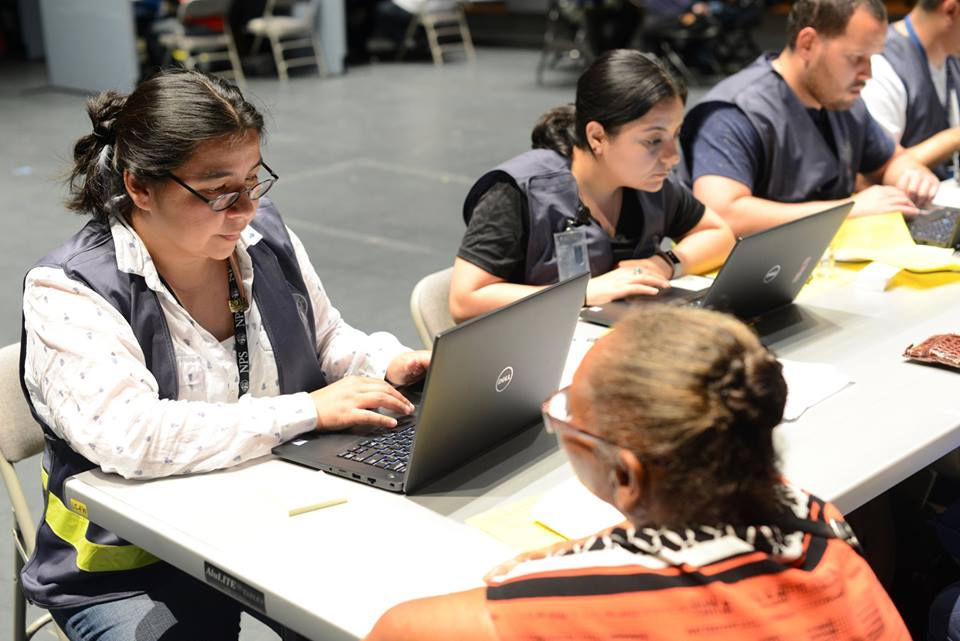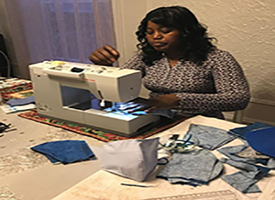Puerto Rican Hurricane Survivor lives to help others
As Hurricane Maria approached my home in Puerto Rico, this island where I was born, I was comforted that my two little girls and I would be safe. Our three-bedroom concrete house in Guayama, a five-minute drive from the closest beach on the southeast coast, was not in a flood zone. It had never flooded. I felt fortunate. My worry in those early days was for others who weren’t as lucky.
As news of the storm’s growing strength reached us, I ran around securing the house, which sits on a tiny hill in a small development. Plastic bags were stuffed in the aluminum louvers in the bedrooms. A plywood panel covered the glass window in the living room. I shoved 10-pound sandbags at the base of the back door. I was prepared. My house was barricaded. Or so I thought.
After a restless night with little sleep, daylight on Sept. 21 greeted us along with floodwaters rushing in from the street into my “safe house.” My first thought was to protect my girls; ages 3 and 4, they are my life. I grabbed milk from the refrigerator, an armful of their clothes and the red life vests I had them wear that magical weekend before when we celebrated my birthday at Jobos Beach in Isabela.
Two doors away were the neighbors we had waved to so many times in the year we lived in Guayama. We sought shelter with them for a short time, but as the floodwaters continued to rise, we moved again. In the midst of the storm, we sloshed through murky floodwaters and found refuge at a stranger’s home a few houses away. A couple in their 50s had taken in a few other neighbors: eight adults, a 14-year-old girl with autism, an 18-month-old, four children under age 12 and two dogs: a German shepherd and a Labrador retriever. For the next six hours or so, their 2,500-square-foot home was our sanctuary.
Soon, the streets of our enclave had turned into rivers, swollen by floodwaters that had nowhere to go as storm drains became clogged with solar panels and other debris. The waters were rising so fast, we knew we had to leave. Even though our pickup truck was partially submerged, it was our only hope for escape. As neighbors worked to unclog the storm drains, my girls’ father got the pickup started. Against driving winds and pelting rain, the girls and I trudged through the floodwaters, climbed into the pickup, and our small family made our way through water-logged streets to the children’s grandparents’ home.
With my girls safe, I returned home that afternoon. The sight was heartbreaking. Water had climbed a foot up the walls. Much of our furniture, some clothes, my architecture degrees, my portfolio of work, the girls’ toys — all were destroyed. I thought I was prepared. I never thought this would happen to me. We were far from rivers, far from the ocean. I never anticipated how high and how fast the floodwaters would rise.
The following days and weeks were agonizing. Not knowing about your family and friends was something new and scary. Scavenging for essentials became my daily focus. I constantly worried about finding milk, food, and water for the girls.
The shelves of local supermarkets that managed to reopen were stocked with leftover goods that had long expired. I spent five hours waiting in line to buy $15 worth of gasoline. I had to decide which errands to run because I needed to conserve gas. We had no cell service. No electricity. Our method of communication resembled what might have been found in the old days. “I left a WhatsApp on your door,” friends would joke when we eventually saw each other. It meant a message was posted on my front door. About 10 days after the storm, a note buoyed my spirits: “Te Amo. Pa.”
Our small neighborhood symbolized generosity, hope and resilience. Neighbors shared chicken strips. When I cooked fresh food, whatever was left unused was shared with my neighbors because there was no refrigerated storage. Neighbors picked up damaged and destroyed items left at the curb and took them to a landfill. They cleaned my girls’ pink-and-white dollhouse, which Maria decided to spare.
For two months, one couple who owned a convenience store and a generator shared power with six neighbors. Extension cords snaked from their house to ours and the generator ran from 6 p.m. to 6 a.m., giving light to a few fortunate ones. Electricity meant my daughters could sleep with a fan and not get eaten alive by mosquitoes. The couple refused to accept any money for diesel. It all made me wonder why I wasn’t better prepared.
With no TV or cell phones to consume our time, the neighbors would barbeque together, sit around chatting and sharing drinks. I started reading again. I taught my girls how to wash clothes by hand. I began to notice children at play, racing bicycles they rode only occasionally before the storm. For eight weeks, that routine was our new post-Maria normal.
 I applied for a job with FEMA and started working the week before Thanksgiving. This job has given me a great sense of satisfaction because I can use my skills and experience to contribute in the recovery of my beloved Puerto Rico.
I applied for a job with FEMA and started working the week before Thanksgiving. This job has given me a great sense of satisfaction because I can use my skills and experience to contribute in the recovery of my beloved Puerto Rico.
Many people left the island after hurricanes Irma and Maria, which came ashore only two weeks apart. Many close friends I knew as a child went to the mainland. Leaving Puerto Rico is not a choice for me. I now live in the northeast, farther away from the water but closer to a new beginning. I am a hopeless optimist, and I want to raise my girls here with our family, and their extended family. In this slice of paradise, surrounded by my people and my culture, I can only hope to live and do my part for a better Puerto Rico.
See original story on the FEMA.Gov website: https://www.fema.gov/comment/reply/330671
Author of the story is: Anely Latalladi Ortega
Like Anely, you can help the survivors in Puerto Rico by becoming a volunteer this Summer 2018. Click here to learn how.
Related News
When Life Gives You Scraps
“It’s so good making masks because it helps the community,” said Sandra, a Congolese refugee...
Read MoreSome recent UCC Disaster MInistries international grants
Here are some recent international grants approved by UCC Disaster Ministries: $20,000 to Global...
Read MoreDisaster recovery initiative is growing ecumenically
A pilot program to help communities launch long-term recovery following disasters is growing...
Read More
